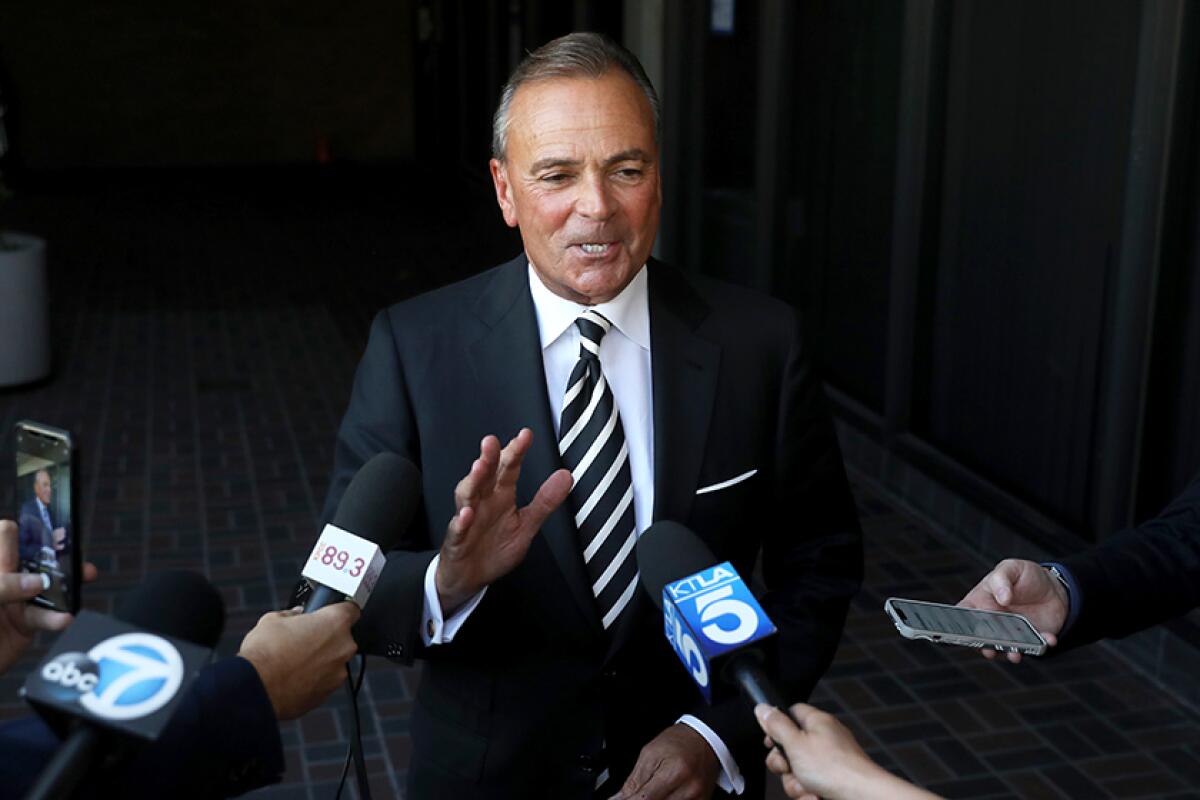Rick Caruso sues to stop Television City project, using a law he once disparaged

- Share via
Good morning, and welcome to L.A. on the Record — our City Hall newsletter. It’s David Zahniser, with an assist from Rebecca Ellis, Dakota Smith and Julia Wick, giving you the latest out of L.A.’s city and county government.
Get the lowdown on L.A. politics
Sign up for our L.A. City Hall newsletter to get weekly insights, scoops and analysis.
You may occasionally receive promotional content from the Los Angeles Times.
Real estate developer Rick Caruso has had some choice words over the years for CEQA, the state’s much-maligned, 55-year-old environmental law.
When he ran for mayor in 2022, he made clear that he viewed CEQA — pronounced see-quah — as an impediment to the construction of much-needed housing in L.A. He called for new measures to crack down on “frivolous” CEQA lawsuits — including a $15,000 filing fee — while urging greater transparency for unions and environmental groups who use the law “unfairly.”
A year later, Caruso told the Onward podcast that the law also had been heavily used by opponents of his shopping malls.
“Every project we were building, we were being sued by the adjacent indoor mall to stop us,” he said. “And they were using CEQA, which is the California environmental [law], as a reason to stop us.”
Now, The Grove LLC — the shopping mall that is owned by Caruso and made him a household name in L.A. — has filed an environmental lawsuit of its own, targeting one of its neighbors. The lawsuit seeks to overturn the city’s approval of the TVC project, the $1-billion expansion and renovation of the former CBS Television City studio.
In the 43-page lawsuit, lawyers for The Grove said city leaders showed a “stunning disregard” for CEQA when they approved the project, which is planned for a 25-acre site at Beverly Boulevard and Fairfax Avenue. The Grove’s legal team called the project “frustratingly undefined,” making it impossible for the public to figure out its size and environmental impacts.
It seems like Caruso has been everywhere over the past month, denouncing the city’s preparation for, and response to, the wildfire that tore through Pacific Palisades, destroying thousands of homes — including two owned by his family.
On the first night of the Palisades fire, Caruso lashed out against Mayor Karen Bass on Fox 11 over the lack of water flowing from L.A. fire hydrants and the fact that she was in Ghana when the blaze broke out. On Joe Rogan’s podcast weeks later, he demanded the ouster of the Department of Water and Power’s top executive.
The City Council approved the TVC project on Jan. 7, the first day of the Palisades fire. Backers said it would provide a much-needed boost to film and television production in a city where many in the industry are out of work. Opponents said it would flood neighborhoods with traffic while doing little to address the decline of the industry in L.A.
On Feb. 3, four days before The Grove filed its lawsuit against the city and TVC’s developer, Caruso downplayed his participation in the legal battle, saying he’s “not directly involved.”
“I own The Grove. That doesn’t mean I’m involved day to day in a lawsuit with our neighbor. We’ve got a great team of people that handle that,” he said in an interview with The Times.
(The Grove LLC does business in California as GFM LLC, according to its lawsuit. Caruso is GFM’s chief executive, according to state business records.)
Caruso, in his interview, insisted he’s not looking to torpedo the TVC development, saying his company’s objections are “all about truck traffic and loading.”
“We’ve never opposed the project,” he said. “We just opposed how they were bringing in their trucks.”
The Grove lawsuit does, in fact, call for a judge to block construction of the TVC project and overturn the city’s various approvals, including the environmental impact report. It alleges the city violated not just CEQA but also state housing law and even Measure HLA, which requires the installation of bus and bike lanes on designated corridors.
Lawyers for The Grove, a regional shopping attraction, also said the TVC development would result in an increase in traffic congestion, “increasing the risk of pedestrian injury or death.”
The Grove lawsuit is now one of at least four seeking to overturn the approval of TVC, which is being developed by Hackman Capital Partners. The Beverly Wilshire Homes Assn., which has been filing environmental lawsuits for decades, assailed the project in its filing, saying Hackman received “massive increases in height and density.”
Save Beverly Fairfax, in another lawsuit, said the TVC project “fails to address the real issues plaguing Los Angeles production.” A.F. Gilmore Co., owner of the Original Farmer’s Market next to The Grove, said in its filing that the city had “run roughshod over CEQA.”
Zach Sokoloff, Hackman’s senior vice president, called the quartet of lawsuits an “unfortunate but predictable abuse of CEQA.” In a statement, he said that Hackman, which owns and operates nearly two dozen studio properties, went through a lengthy review process and won support from neighbors, business groups, historic preservationists and thousands of people who work in film and television production.
“Despite these continued efforts to block this investment into the entertainment industry, we remain steadfast in our commitment to keeping Hollywood in Hollywood,” he said.
Catherine Clinch, a longtime television writer who worked on such shows as “The Love Boat” and “Hart to Hart,” described Caruso’s actions as hypocritical, given his previous statements. She fears the new legal challenges could delay or even doom the TVC project at a critical time for the industry.
“We need studios. There’s new studios in New Mexico. There’s new studios in Buffalo, New York, for crying out loud,” said Clinch, who lives nearby.
Chris Robertson, senior vice president for Caruso — the company, not the man — said in a statement that The Grove “strongly supports the entertainment industry.”
“But we all need to be good neighbors, and without changes, this project will create additional traffic, parking problems, pollution and other harmful impacts in our community,” she said.
Others in the neighborhood applauded Caruso’s involvement.
Shelley Wagers, who co-chairs Neighbors for a Responsible TVC Development, said she has “grave concerns” about traffic, emergency response times and the city’s approval process.
“I’m very glad that there are four suits that have been filed, Caruso among them of course,” she said. “And I’m frankly grateful that there are groups with the commitment and the wherewithal and the means to challenge something that is very troubling.”
Caruso, during his unsuccessful campaign for mayor, spoke of the need to keep Hollywood production in Los Angeles. But that message was undermined by his company’s fight against TVC.
For now, Caruso has mostly sidestepped questions about his political future, telling The Times last week that he’s not thinking about whether to run for public office a second time — either mayor or governor. If the lawsuits drag on, and he launches another campaign, the future of Television City could become a potent issue.
State of play
— CZAR WARS: Los Angeles Mayor Karen Bass reversed course last week on her plan to pay her disaster recovery czar, Steve Soboroff, $500,000 for 90 days of work — compensation that would have been covered by private philanthropy. After The Times reported on the arrangement, Soboroff defended the amount, saying his specialized expertise was worth the fee. But then critics began speaking out against the deal, which Councilmember Monica Rodriguez called “obscene.” Soboroff will now work for free, according to Bass.
— WHO’S ON FIRST: The struggle over Soboroff is part of a larger issue that has confused the public since the outbreak of the Palisades fire: Who’s in charge? Soboroff was initially tasked with developing a comprehensive rebuilding strategy. Then Bass announced she had selected Hagerty Consulting, a disaster recovery firm, to help do that work. Hagerty, in turn, was told to report to Jim Featherstone, the No. 2 in the city’s Emergency Management Department. Bass said she remains at the top of the org chart. “The person that’s in charge is here: Me,” she told reporters last week.
—CONVENE THE CONVENERS: Meanwhile, it’s not clear how the private-sector groups looking to assist fire rebuilding will work together, if at all. At last count, four separate groups had launched, with a long list of civic leaders at their helms. Soboroff said Friday that he has invited some of those leaders — Casey Wasserman, Magic Johnson, Miguel Santana, Evan Spiegel, Rick Caruso and Times owner Patrick Soon-Shiong — to a Zoom meeting next week to learn about the work each group is doing.
— RACIST RECRUITMENT? Four LAPD officers are under investigation for allegedly making racist and sexist remarks while working with new recruits — accusations that Mayor Karen Bass called “especially outrageous and unacceptable.”
— L.A. LAW: Faced with a deluge of litigation from the Palisades fire, the Department of Water and Power approved a three-year, $10-million contract with a top law firm to defend the utility. Munger, Tolles & Olson will investigate claims and respond to lawsuits from residents whose homes were destroyed or damaged, with the firm’s partners charging up to $1,975 per hour.
— TESTING TOSSED: Federal cleanup crews confirmed they will not test the soil of properties ravaged by last month’s wildfires once debris removal is finished. That decision marks a break with a long-standing strategy used by the U.S. Army Corps of Engineers after other major wildfires. Army Corps officials still intend to remove six inches of topsoil from each site, which they described as enough to rid properties of hazardous pollution.
— YIMBYS POUNCE: Two pro-development groups have sued the city, alleging that a recently approved plan for boosting home building is inadequate and fails to comply with state law. Yes In My Back Yard and Californians for Homeownership contend that city officials have not shown that their plan for growth can accommodate an additional 255,000 homes, as required under state law.
— WHOLE LOTTA LAWSUITS: Here’s even more litigation news: L.A. County agencies have been hit with a record number of lawsuits — 2,675 in the last fiscal year, about 400 more than the prior year.
— READY FOR RAIDS: Federal law enforcement agents are planning to carry out a “large scale” immigration enforcement action in L.A. before the end of the month, according to internal documents reviewed by The Times. Meantime, immigrant rights activists are vowing to disrupt any raids.
— PREPPING FOR ’26: The Department of Recreation and Parks has begun laying the groundwork for a bond measure in 2026 to generate funding for its facilities. Meanwhile, two council members — Rodriguez and Traci Park — say the council is not moving fast enough in preparing another 2026 bond measure to build or repair fire stations. The effort to assess the fire department’s needs was the subject of a lengthy debate on the council floor this week.
Enjoying this newsletter? Consider subscribing to the Los Angeles Times
Your support helps us deliver the news that matters most. Become a subscriber.
QUICK HITS
- Where is Inside Safe? The mayor’s signature program to fight homelessness went to the corner of Sunset Boulevard and Custer Avenue, where an encampment filled a cul-de-sac next to a CVS pharmacy. That location is in Councilmember Eunisses Hernandez’s district. Inside Safe also went to 6th and Alameda streets in the downtown section of Councilmember Ysabel Jurado’s district.
- On the docket for next week: The county Board of Supervisors meets Tuesday to take up a measure temporarily barring landlords from evicting renters for non-payment if they show they’ve been financially impacted by the wildfires. The proposal would protect tenants who owe rent due between Feb. 1, 2025 and Jan. 31, 2026.
Stay in touch
That’s it for this week! Send your questions, comments and gossip to [email protected]. Did a friend forward you this email? Sign up here to get it in your inbox every Saturday morning.
Sign up for Essential California
The most important California stories and recommendations in your inbox every morning.
You may occasionally receive promotional content from the Los Angeles Times.




